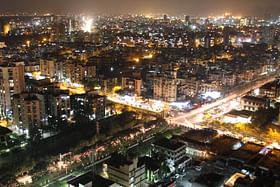More than 25 regions under the civic jurisdiction will be connected with the sewerage infrastructure, to be developed along with treatment plants.
The Panvel Municipal Corporation (PMC) has received administrative approval for creating infrastructure for water supply and sewerage systems.
The project cost has been approved at over Rs 355.74 crore and the civic body will float tenders for these works soon.
Of the total Rs 355.74 crore, Rs 148.16 crore has been sanctioned for projects and initiatives for improving water supply in the regions.
The remaining Rs 207.58 crore is sanctioned for sewerage systems, which includes development of drainage networks, pipelines and sewage treatment plants.
Meanwhile, the civic body will take a 30 per cent financial share in both of these infrastructure segments, providing Rs 44.45 crore for the water supply projects and Rs 62.27 crore for the sewerage projects.
The state government is implementing the projects under the Central government sponsored Atal Mission for Rejuvenation and Urban Transformation (AMRUT) 2.0 scheme, which started in 2021-2022.
More than 25 regions under the civic jurisdiction will be connected with the sewerage infrastructure along with treatment plants.
Under this scheme, additional infrastructure facilities such as lake rejuvenation and increasing green area development are also being developed in all the local bodies of the state.
Civic Infrastructure Push For Navi Mumbai
The areas under Navi Mumbai were designed to decongest Mumbai, and it is one of the largest planned developments in India.
With enhanced facilities and growing potential to provide economic opportunities and improved quality of living, the region is experiencing rapid expansion, acting as a core support to Mumbai mainland.
For Panvel, since the establishment of PMC, the development of the region has accelerated.
Ganesh Deshmukh, the civic chief, has started to effectively implement various schemes from the state and central governments in the municipal sector, prioritising the corporation’s development.
As a part of the growing Mumbai Metropolitan Region (MMR), there is also added pressure on civic infrastructure to establish efficient and advanced systems for:
- regular drinking water supply
- wastewater collection network
- solid waste management systems
- 100 per cent sewerage networks
- sewage treatment plants (STPs) and disposal systems
- stormwater network
- the reuse distribution systems
Along with the development of these infrastructural facilities, special emphasis is also given to the beautification of the city, additionally focusing on open spaces, green areas, through the scheme.
The planned civic infrastructure for the future growing regions ensures positive effects on the overall living environments with improvements in public health, hygiene condition, air quality and more for these regions.
AMRUT 2.0 For Maharashtra
The implementation of the second phase of the AMRUT scheme in Maharashtra was approved by the Eknath Shinde government in July 2022.
As per media reports, Shinde said that about 50 per cent of the state population lives in urban areas and there are a total of 413 urban local bodies in the state.
With this urban transformation initiative on board, the main objectives are to make all houses 100 per cent self-sufficient in terms of water supply by providing tap connections, rejuvenating water resources, sewage treatment and sewage connections along with developing parks and green areas in the city.
AMRUT 1.0 has been implemented in the state since 2015 but it was limited to only 44 cities in the state.
However, under AMRUT 2.0, projects will be implemented in all the civil local bodies of the state. Following the same, projects worth Rs 27,700 crore will be undertaken in the state.
Out of this, central financial assistance will amount to Rs 9,285 crore, while Rs 18,415 crore will be contributed by the state government and the urban local self-government bodies, according to its classification.
About AMRUT 2.0
AMRUT 2.0 scheme was launched by Prime Minister Narendra Modi on 01 October 2021.
The mission is inclined with the Sustainable Development Goal-6 (SDG 6) and aims to expand the ease of living in the water sector to all statutory towns.
SDG 6, by 2030, intends to significantly improve water usage efficiency across all sectors, ensure sustainable freshwater withdrawals, and significantly reduce the number of people who experience water scarcity.
The scheme will ensure that AMRUT cities have complete coverage of water supply and sewage management, and is moving forward with a total indicative outlay of Rs 277,000 crore, till the years 2025-2026.


